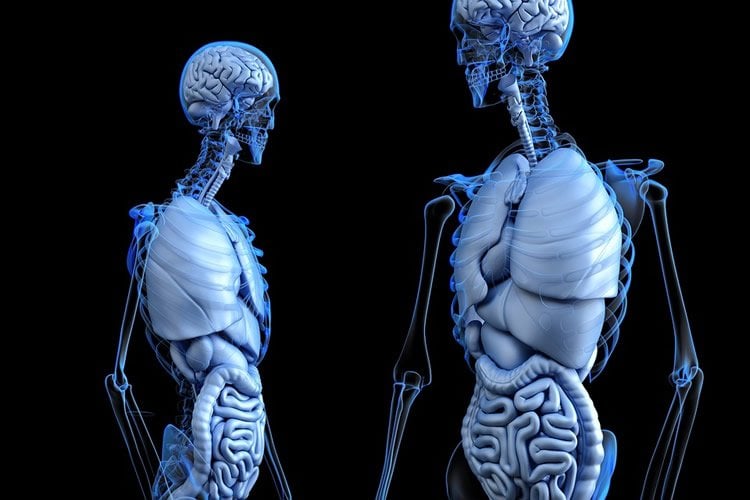Summary: Researchers debate the roles of the gut and brain hormones play in regulating appetite and metabolism.
Source: Society for Endocrinology.
Whether gut or brain hormones are more important for the regulation of appetite and metabolism is not clearly defined. Imbalances in the control of appetite and metabolism can lead to obesity and diabetes, which have a negative impact on people’s health and healthcare costs. In a live debate to be held at the Society for Endocrinology annual conference in Glasgow, leading experts will debate this issue in a session entitled, ‘This house believes that the gut is the conductor of the endocrine orchestra.’ The experts will explore the evidence supporting the roles of gut and brain hormones in metabolism, and discuss how best to target future research and treatment strategies for overweight and diabetic patients.
Obesity and diabetes are growing global health epidemics and much attention is focused on how best to treat these disorders, to avoid debilitating complications. The hormonal control of appetite and metabolism is complex and involves a mix of both brain and gut hormones, including insulin, leptin and ghrelin. Release and control of these hormones can be considered akin to an orchestra, with levels of each hormone changing rhythmically in response to each other. However, whether the brain or the gut has more influence, like the conductor of an orchestra has not been established. A better understanding of the combined roles of the brain and gut hormones in controlling these functions could lead to improved targeting of research, and development of more effective treatments for diseases such as obesity and diabetes.
In this debate, experts Dr Carel Le Roux and Dr Giles Yeo, will examine the evidence for and against the brain or gut as the mastermind organ behind hormonal regulation of appetite and metabolism, and discuss the implications for future research and disease treatments.
Dr Carel Le Roux, Reader in Investigative Science at Imperial College London, believes that the gut directs hormonal control in the body and should be the focus when treating many hormonal imbalances and diseases.
Dr Le Roux states, “The gut is the largest endocrine organ in the body. Every time we have a meal our body responds by releasing a cocktail of gut hormones that are in perfect concert to communicate with all of our other organs.”
He continues, “The gut is now the main focus for finding therapeutic solutions to better treat type-1 and type-2 diabetes. The most successful treatments for obesity also use the power of the gut as an endocrine organ to cause and maintain weight loss.”

However, Dr Giles Yeo, Principal Research Associate at the MRC Metabolic Diseases Unit, University of Cambridge, disagrees and believes that the brain controls hormonal release by regulating appetite and that without it the majority of hormone signals released from the gut when we eat would fail to take effect.
He states, “Most gene mutations that lead to patients developing severe obesity are in genes involved in the brain. Moreover, subtle variations in our genes that are linked to changes in body mass index also most commonly involve genes active in the brain.”
Dr Yeo comments, “I agree that weight loss surgery changes the hormones released from the gut, making you feel fuller, so you eat less. It is, however, the brain that facilitates these changes. I believe that studying the genetics of how the brain responds to hormones and regulates their activity could pave the way for the development of personalised medicine to treat highly debilitating diseases such as obesity in the future.”
Source: Ben Ede – Society for Endocrinology
Publisher: Organized by NeuroscienceNews.com.
Image Source: NeuroscienceNews.com image is in the public domain.
Original Research: The study will be presented at the Society for Endocrinology Annual Conference.
[cbtabs][cbtab title=”MLA”]Society for Endocrinology”Is the Gut or Brain More Important in Regulating Appetite and Metabolism?.” NeuroscienceNews. NeuroscienceNews, 19 November 2019.
<https://neurosciencenews.com/gut-brain-appetite-10218/>.[/cbtab][cbtab title=”APA”]Society for Endocrinology(2019, November 19). Is the Gut or Brain More Important in Regulating Appetite and Metabolism?. NeuroscienceNews. Retrieved November 19, 2019 from https://neurosciencenews.com/gut-brain-appetite-10218/[/cbtab][cbtab title=”Chicago”]Society for Endocrinology”Is the Gut or Brain More Important in Regulating Appetite and Metabolism?.” https://neurosciencenews.com/gut-brain-appetite-10218/ (accessed November 19, 2019).[/cbtab][/cbtabs]






